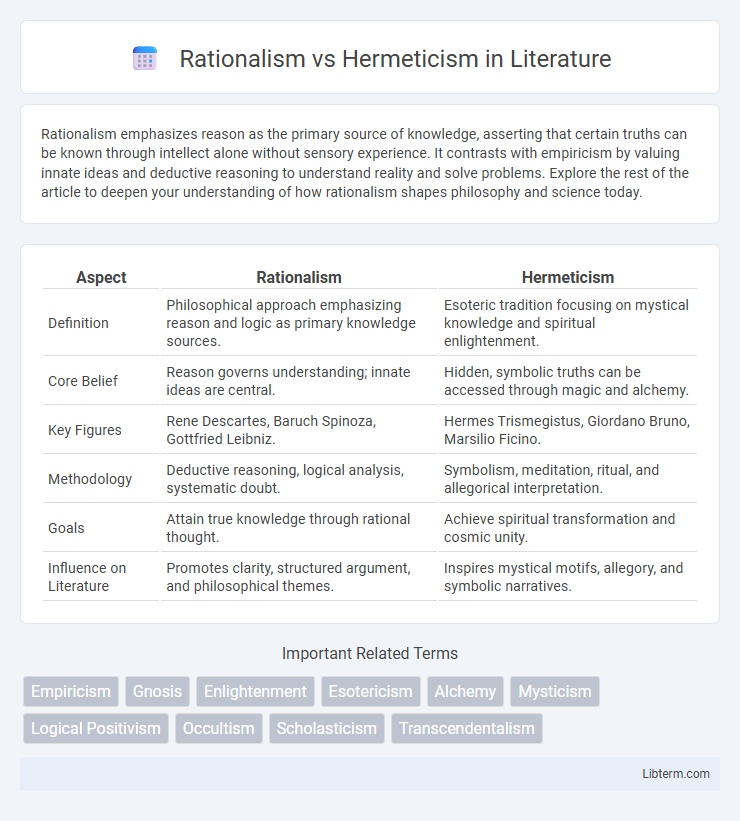Rationalism emphasizes reason as the primary source of knowledge, asserting that certain truths can be known through intellect alone without sensory experience. It contrasts with empiricism by valuing innate ideas and deductive reasoning to understand reality and solve problems. Explore the rest of the article to deepen your understanding of how rationalism shapes philosophy and science today.
Table of Comparison
| Aspect | Rationalism | Hermeticism |
|---|---|---|
| Definition | Philosophical approach emphasizing reason and logic as primary knowledge sources. | Esoteric tradition focusing on mystical knowledge and spiritual enlightenment. |
| Core Belief | Reason governs understanding; innate ideas are central. | Hidden, symbolic truths can be accessed through magic and alchemy. |
| Key Figures | Rene Descartes, Baruch Spinoza, Gottfried Leibniz. | Hermes Trismegistus, Giordano Bruno, Marsilio Ficino. |
| Methodology | Deductive reasoning, logical analysis, systematic doubt. | Symbolism, meditation, ritual, and allegorical interpretation. |
| Goals | Attain true knowledge through rational thought. | Achieve spiritual transformation and cosmic unity. |
| Influence on Literature | Promotes clarity, structured argument, and philosophical themes. | Inspires mystical motifs, allegory, and symbolic narratives. |
Introduction to Rationalism and Hermeticism
Rationalism emphasizes reason and logic as the primary sources of knowledge, advocating that truth can be discovered through intellectual deduction and empirical evidence. Hermeticism, rooted in ancient esoteric traditions, centers on the belief in hidden spiritual truths and the interconnectedness of the cosmos, often relying on symbolic interpretation and mystical insight. Both philosophies offer distinct approaches to understanding reality, with rationalism grounded in analytical thought and Hermeticism embracing metaphysical and symbolic wisdom.
Historical Origins and Development
Rationalism originated in the 17th century during the European Enlightenment, emphasizing reason and empirical evidence as the primary sources of knowledge, with key figures like Descartes and Spinoza shaping its foundation. Hermeticism traces back to the early centuries of the Common Era, derived from texts attributed to Hermes Trismegistus, blending elements of Greek philosophy, Egyptian religion, and mystical spirituality. The development of Hermeticism influenced Renaissance esotericism and the rise of occult traditions, contrasting with Rationalism's focus on logic and scientific methodology.
Core Philosophical Principles of Rationalism
Rationalism centers on the belief that reason and intellectual deduction are the primary sources of knowledge, emphasizing innate ideas and logical analysis over sensory experience. It asserts that certain truths, such as mathematical and metaphysical principles, can be known a priori, independent of empirical evidence. This contrasts with Hermeticism's reliance on esoteric traditions and mystical insights, where hidden spiritual realities are accessed through symbolic interpretation and initiation.
Fundamental Doctrines of Hermeticism
Hermeticism centers on core doctrines such as the unity of all existence, the correspondence between the macrocosm and microcosm, and the belief in hidden divine knowledge transmitted through hermetic texts. Unlike rationalism, which emphasizes reason and empirical evidence, Hermeticism prioritizes mystical insight and spiritual initiation to access higher truths. Key concepts include the principle "As above, so below," transmutation of the soul, and the pursuit of gnosis as a path to enlightenment.
Knowledge Acquisition: Reason vs. Mysticism
Rationalism emphasizes knowledge acquisition through logical reasoning, empirical evidence, and systematic doubt, seeking truth via intellectual clarity and critical thinking. Hermeticism embraces mysticism, relying on esoteric insights, symbolic interpretation, and spiritual revelation as pathways to understanding hidden truths beyond material reality. The contrast highlights rationalism's foundation in objective analysis versus hermeticism's focus on metaphysical experience and inner wisdom.
Influential Figures in Rationalism and Hermeticism
Rene Descartes, often hailed as the father of modern Rationalism, emphasized reason and mathematical clarity as pathways to knowledge, while Baruch Spinoza advanced a monist view integrating God and nature through rational thought. In Hermeticism, Hermes Trismegistus, a legendary Hellenistic figure, embodies the synthesis of philosophical, mystical, and alchemical wisdom foundational to the tradition, and later figures like Giordano Bruno expanded Hermetic ideas by linking them to cosmological theories and Renaissance occultism. These thinkers profoundly shaped their respective domains by advocating either empirical reasoning or esoteric spiritual knowledge as means to uncover universal truths.
Rationalism and Hermeticism in Enlightenment Thought
Rationalism in Enlightenment thought emphasized reason as the primary source of knowledge, advocating for scientific inquiry and empirical evidence to understand the natural world. Hermeticism, with its roots in mystical and esoteric traditions, influenced Enlightenment thinkers by promoting hidden knowledge and the interconnectedness of the cosmos, often contrasting with the era's rationalist ideals. The tension between these frameworks shaped philosophical debates on knowledge, spirituality, and the limits of human reason during the 17th and 18th centuries.
Scientific Methods versus Esoteric Practice
Rationalism emphasizes the scientific method, relying on empirical evidence, logical reasoning, and systematic experimentation to understand reality. In contrast, Hermeticism centers on esoteric practices, spiritual symbolism, and mystical insights drawn from ancient texts, aiming for inner transformation and hidden knowledge. While Rationalism advances knowledge through observable data and replicable results, Hermeticism seeks wisdom beyond the material world through intuition and metaphysical principles.
Contemporary Relevance and Applications
Rationalism, emphasizing logic and empirical evidence, underpins modern scientific methodologies and technological advancements, driving innovations in artificial intelligence and data analytics. Hermeticism, with its focus on esoteric knowledge and spiritual transformation, influences contemporary holistic wellness practices and psychological frameworks like Jungian archetypes. Both frameworks contribute to interdisciplinary approaches in philosophy, psychology, and cultural studies, enriching debates on consciousness, ethics, and epistemology.
Conclusion: Bridging Rationalism and Hermeticism
Bridging Rationalism and Hermeticism involves synthesizing empirical reasoning with mystical insights to create a holistic worldview that values both scientific inquiry and esoteric wisdom. This integration fosters a balanced approach where rational analysis complements spiritual exploration, enhancing understanding of reality beyond purely material explanations. Embracing this synergy encourages innovative thinking that transcends traditional dichotomies, promoting intellectual and metaphysical growth.
Rationalism Infographic

 libterm.com
libterm.com